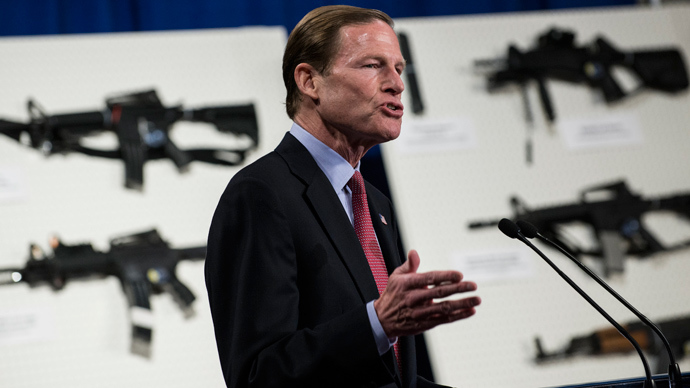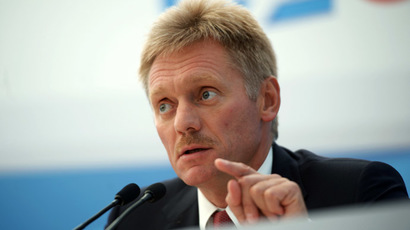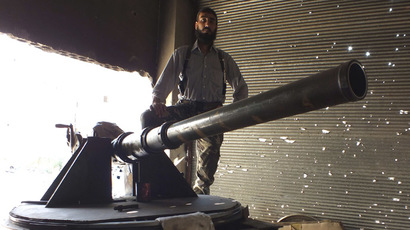Sour over Syria: American senators attack Russian banks

In Cold War style, US Senators have urged the Obama administration to freeze assets of three major Russian banks, ban their activities in the US, and deny employees’ entry into the country on the suspicion they are doing business with the Assad regime.
Having failed to galvanize allies for military action, and
politically trumped by President Putin’s proposal for peaceful
intervention in Syria, American congressmen have now turned to
soft power to regain a grip on the Syria conflict. The
senators are blaming Russia’s banking giants VTB, Gazprombank,
and Vnesheconombank -the state development bank known as VEB– for
‘undermining’ UN sanctions by ‘aiding Assad’.
“The Syrians could not conduct this war without Russian
financing,” Richard Blumenthal, a Democrat who represents the
state of Connecticut, said at a US policy meeting on Iran and
Syria at the Bipartisan Policy Center in Washington DC.
“We can freeze their assets. We can stop them from doing
business in the United States, prevent their employees from
traveling here and, in effect, impose very heavy financial pain
on the Russians,” Blumenthal said.
The letter accuses VTB of holding President
Assad's personal accounts, VEB for facilitating Syrian payments
for S-300 missile systems, and Russia’s third largest lender
Gazprombank for making payments on crude oil. The senators
believe these institutions should be ‘barred from the US
financial system’.
Blumenthal’s call to ‘swiftly designate’ Russia’s big banks is
based on ‘numerous reports’ one which Reuters published on August 29. The Reuters report
cited a source in the Russian defense industry that said Assad
had started payments on a $1 billion contract for S-300
anti-missile defense systems as well as a $500 million order for
36 Yak-130 fighter planes. The source said the first down payment
of 20 percent was already complete.
Syria’s central bank held foreign currency accounts with the
three banks, Reuters’ reported, citing a local Syrian newspaper
article dated 2011.
'Completely unfounded'
VTB issued a statement in response to the senators’ allegations,
stating their bank has no business with President Assad or Syrian
leadership.
“We consider these allegations to be a deliberate attempt to mislead the American people. These irresponsible insinuations are clearly intended to ratchet up tensions around Syria's economic and financial situation,” the statement said.
VTB president Andrey Kostin has repeatedly warned against the
economic havoc the Syria conflict could wreak on the Russian, and
global economy, with a spike in oil prices.
The VTB Group operates in more than 20 countries across the former Soviet Union, Europe, Asia, and Africa, and in the US. State-owned VTB is Russia’s second largest bank, and as of 30 June 2013 reported assets of roughly $258.9 billion.
Gazprombank, Russia’s third largest bank, has offices across the
globe from China, India, and Europe, and holds $99.7 billion in
assets.
VEB chairman Vladimir Dmitriyev said he had no knowledge of direct links to Syria. With assets of roughly $80.2 billion as of December 30, 2012, VEB is Russia’s fourth largest bank. The bank will need nearly $30 billion to recapitalize within the next seven years to save it from debt it acauired on bad loans.
"Historically, VEB acts on behalf of the government in terms
of servicing the foreign debt of Russia, including settlements
with Syria. Our bank does not have any other business with the
Central Bank of Syria, its government, or government-controlled
organizations. All the activities carried out by VEB are strictly
in accordance with the sanctions adopted by the EU and the UN on
the Syrian Republic," VEB’s press service told RIA Novosti.
Reuter’s defense industry source claimed Syrian money is being
funneled through smaller, second-tier Russian banks, possibly
located outside of Moscow.
The United States and European Union, and the UN have imposed
sanctions on Syria's financial system, but reports have surfaced
accusing Russian banks in helping circumvent sanctions by holding
Syrian funds legally in the West.
The weapon trail
The accusation came just days after US Secretary of State John
Kerry and his Russian counterpart, Sergey Lavrov, brokered a
deal to work collectively with the UN to
deplete Assad’s chemical weapons stockpile, a plan Assad himself
has also signed off on.
President Putin, who has largely orchestrated the Syrian chemical
weapon solution, said his country hasn’t made any S-300
deliveries to Syria.
At June’s G8 Summit in Northern Ireland, Putin said Russia
“arms under legal contracts to legitimate governments.”
In the past two weeks the US has reportedly begun delivering arms
to anti-Assad militants, which they expect the CIA to monitor.
Reuters’ report focuses on the weapons trail between Russia and
Syria, and Blumenthal’s asset freeze request accuses VEB of
facilitating arms deals to Syria, as well as Rosoboronexport,
Russia’s state arms dealer. The civil war between Assad and
rebels broke out in 2011, before which Russia provided 50 percent
of Syria’s armaments, according to Reuters.
Oil, not arms
While Russia is arming Syria, it’s not a staple of their economy.
The arms business is peanuts compared to oil, which the country
depends on for nearly half of their budget revenue.
Russian exports to Syria in 2011 largely consisted of weapons,
and totaled $1.93 billion, according to Daniel Treisman, a
Political Science professor at the University of California Los
Angeles. CAST, a Moscow-based think tank, put the number higher
at $6 billion. The IMF estimates Russia’s 2011 GDP at roughly $2
trillion, thereby placing Russia’s overall economic activity in
Syria’s weapons trade in 2011 somewhere between 0.001 and 0.006,
whereas oil accounts for over 50 percent.
War in Syria would superficially spike oil prices and bring severe volatility to the
Russian market, which a few billion in weapons sales would not
come close to offsetting.
If Russia was really making big bucks as a weapons supplier to
Syria, they would have supported, even welcomed Obama’s strikes.
But Russia wants stability in the region.
“Oil prices may rocket, which could bring Russia some
short-term profit, but it would certainly be bad from the
perspective of global growth,” VTB head Andrey Kostin told
RIA Novosti in early September.














